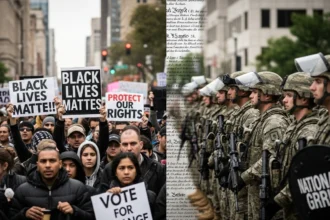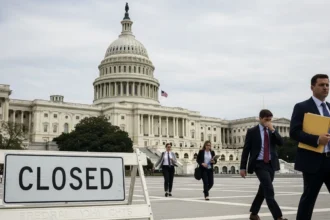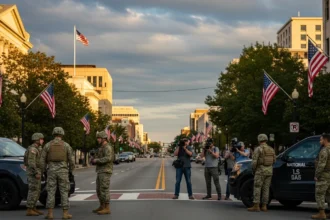In 2025, former President Donald Trump’s hardline immigration agenda has sparked one of the most explosive power struggles in modern U.S. history. From large-scale ICE raids to the mobilization of National Guard troops, Trump’s administration is testing the limits of federal authority — and provoking legal and political rebellion from the states.
- Trump’s Border Agenda: “Law and Order at Any Cost”
- Federal Troop Deployments and State Resistance
- Legal Showdown: The Insurrection Act vs. State Sovereignty
- Political Fallout: Red States Applaud, Blue States Resist
- Impact on Civil Rights and Communities
- Expert Opinions: A Constitutional Breaking Point
- What Happens Next
- Conclusion
At the center of it all is Trump’s renewed threat to invoke the Insurrection Act, a centuries-old law that would allow him to deploy federal troops into American cities. As part of this broader strategy, Trump has even hinted at invoking the Insurrection Act to deploy troops into U.S. cities, fueling intense backlash from governors, mayors, and civil rights groups.
Trump’s Border Agenda: “Law and Order at Any Cost”
Since returning to the White House, Trump has promised to “restore control” at the U.S.–Mexico border. His administration claims that illegal crossings have dropped by more than 70% since January, citing tougher deportation efforts and stricter enforcement measures.
In an October briefing, the Department of Homeland Security (DHS) said it had deported nearly 200,000 noncitizens in 2025, including thousands with prior criminal convictions. The administration argues these measures are necessary to protect national security and “reclaim order” in what it calls sanctuary jurisdictions.
However, state leaders accuse Trump of using immigration enforcement as a pretext to expand executive power – far beyond constitutional limits.
Federal Troop Deployments and State Resistance
By late September 2025, Trump ordered the federalization of National Guard units from Texas and Illinois — and moved hundreds of troops toward Chicago and Portland to “assist with federal immigration enforcement.”
- Illinois Governor J.B. Pritzker called the move an illegal seizure of state authority and filed a federal lawsuit to block the deployment. (Reuters – Illinois sues to block Trump’s Guard deployment)
- In Oregon, federal Judge Karin Immergut issued a temporary injunction halting Trump’s order to deploy Guard troops to Portland, citing “grave constitutional questions.” (Reuters – U.S. judge blocks Trump’s Guard order in Oregon)
- Trump responded by suggesting he could invoke the Insurrection Act if states continued to resist, saying he “will not allow local politicians to defy federal law.” (Financial Times – Trump threatens to invoke Insurrection Act)
Illinois and Chicago’s joint lawsuit argues that the president’s order violates both the Constitution’s Tenth Amendment and the Posse Comitatus Act, which restricts military involvement in domestic law enforcement.
Legal Showdown: The Insurrection Act vs. State Sovereignty
The Insurrection Act of 1807 allows a president to deploy U.S. troops domestically in cases of rebellion, insurrection, or obstruction of federal law. It has been used only a handful of times in U.S. history — most notably during the 1957 Little Rock desegregation crisis and the 1992 Los Angeles riots.
Legal experts warn that Trump’s situation doesn’t meet that threshold. The Brennan Center for Justice notes that the law is “not a catch-all authority for domestic policing” and was never intended for immigration enforcement. (Axios – Legal experts on Insurrection Act limits)
The Posse Comitatus Act (1878) further restricts military use in civilian law enforcement — a cornerstone principle separating military and civilian power.
Constitutional scholars argue that if Trump invokes the Insurrection Act without clear evidence of rebellion, it could spark the most significant constitutional crisis since Watergate.
Political Fallout: Red States Applaud, Blue States Resist
Trump’s supporters in conservative states praise the move as “courageous” and “long overdue.” Texas Governor Greg Abbott, one of Trump’s closest allies, called the deployments “a necessary step to protect Americans.”
Meanwhile, Democratic leaders see something more alarming. Chicago Mayor Brandon Johnson has called the move “political theater with military consequences.” Oregon’s Attorney General Ellen Rosenblum labeled it “un-American and unconstitutional.”
The Washington Post reports that several cities, including Los Angeles and New York, are preparing legal measures to prevent federal agents or troops from operating within their jurisdictions. (Washington Post – Cities prepare legal pushback)
Public opinion remains sharply divided — with about half of Americans supporting tougher immigration enforcement but a majority opposing troop use in cities.
Impact on Civil Rights and Communities
Civil rights organizations, including the ACLU and Human Rights Watch, warn that Trump’s plan could lead to widespread violations of civil liberties.
- Immigrant families in Chicago, Portland, and Los Angeles report fear of arrest and deportation.
- Local police departments are struggling to coordinate with federal agents amid political tensions.
- Protest movements have reignited nationwide, echoing scenes from the 2020 Black Lives Matter demonstrations. (The Guardian – Texas troops sent to Chicago amid protests)
Experts warn that if military involvement escalates, it could further strain trust between communities and law enforcement.
Expert Opinions: A Constitutional Breaking Point
“Using the Insurrection Act to override state objections is a red line,” says Dr. Elaine Porter, constitutional law professor at Georgetown University. “It fundamentally alters the balance of power between states and the federal government.”
Legal historian Benjamin Carter adds that the act’s misuse could open the door to “a permanent national security state under the guise of immigration control.”
Even some conservatives have expressed caution. Former Defense Secretary Mark Esper told reporters that the military “should never be drawn into domestic politics.”
What Happens Next
- Court Hearings: Federal courts in Illinois and Oregon are reviewing injunctions that could limit the president’s power to federalize state Guard units.
- Potential Invocation: If Trump formally invokes the Insurrection Act, expect immediate appeals to the Supreme Court.
- Congressional Oversight: Lawmakers are discussing bipartisan hearings on presidential limits in domestic security matters.
- Nationwide Protests: Civil-rights organizations are preparing coordinated demonstrations across major cities.
Observers warn that these next steps could either reaffirm constitutional checks or grant the presidency unprecedented domestic authority.
Conclusion
Trump’s 2025 border crackdown has transformed from an immigration issue into a constitutional turning point. It’s a battle not just over policy, but over power itself—who commands the National Guard, who enforces the law, and who defines the limits of the presidency.
Whether courts block or uphold Trump’s authority, the Insurrection Act controversy will likely shape how America defines democracy and state rights for decades to come.












